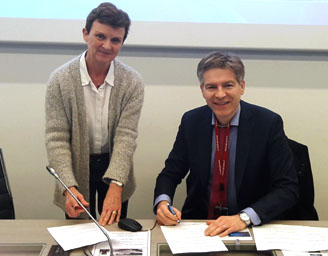NATO signs a cooperation agreement with ISIT in the field of translation
As France is calling upon its experts to design a new model of education which places a new emphasis on in-company training and experience, the Headquarters of the North Atlantic Treaty Organization (NATO) is moving to develop closer ties with academia in the field of translation before launching a new recruitment campaign for francophone translators.

In this context, the Organization, represented by its translation service, has just signed a cooperation agreement with ISIT, a French intercultural management and communication institution with an excellent reputation on the translation market. This agreement covers terminology discussions, presentations and workshops by NATO translators at ISIT, as well as greater cooperation on recruitment.
“It was important for us to develop a closer relationship with a prestigious university such as ISIT because we noticed that francophone translators did not necessarily know that NATO is a bilingual organization with an in-house translation team at its Headquarters. We see this as an opportunity to better inform students about our work and to help them prepare themselves for our recruitment competitions,” said the representative of the NATO HQ Translation Service at NATO Headquarters, Raphaël Prono.

“Our institution was established in 1957 in the context of the European integration process with a mission to train professionals skilled at conveying meaning and bridging divides. So we have an inherently international focus. This agreement formalizes the long-standing relationship between ISIT and NATO. Training, employability and research opportunities: our two institutions have a bright future together!” said Nathalie Gormezano, Executive Director of ISIT.
Through this initiative, students should be able to gain even more real-life experience and better understand the complexities they will face when they take their first steps in the professional world. This is a chance to get guidance from professionals accustomed to translating not only joint statements by the Heads of State and Government of the 29 NATO countries but also complex technical documents. For the NATO translation team, the aim is clear: to find new talent that will flourish in a service that seeks excellence, in a friendly atmosphere of mutual assistance.
